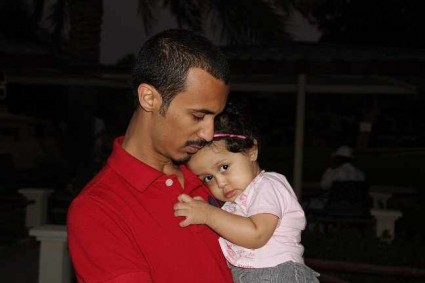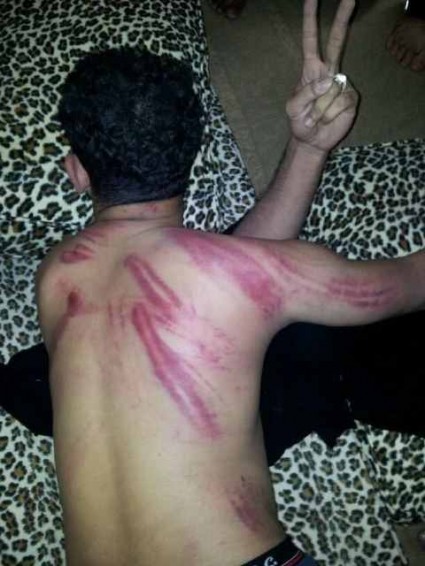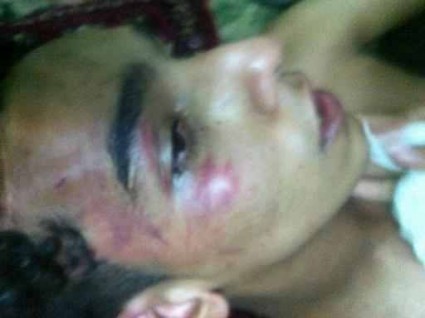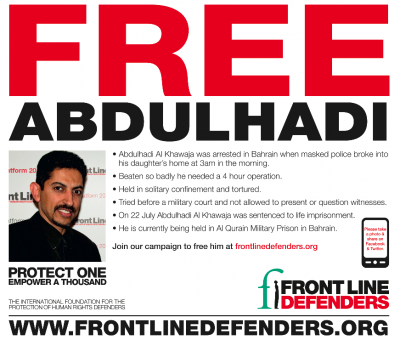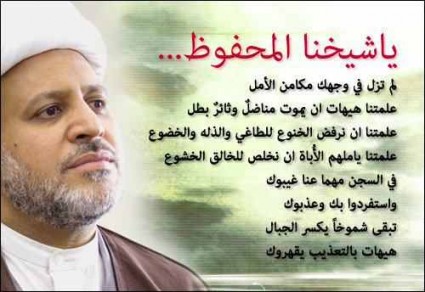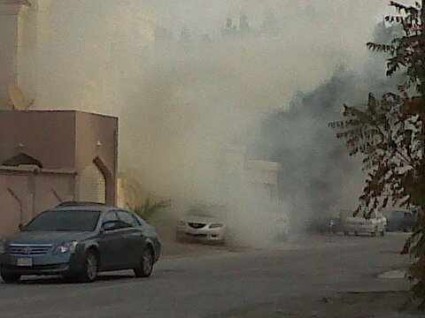Posts from — December 2011
GCC, the Grave Yard of Tyranny and Greed
The GCC investment in Jordan and Morocco is not an investment in stable governance. If they wanted to support democracy and stability, they would have invested in Tunisia and Egypt. Instead, they are investing in regimes that mimic their own Umayyad model of governance. The GCC rulers embraced a selective policy of condemning regimes, like the Syrian one, for abusing their citizens while throwing a safety line to other abusive Bahraini, Moroccan, and Jordanian regimes. Such a policy is shortsighted and unproductive. Western countries should be wary of such political engineering intended to preserve clannish rule, not representative governance.
The Gulf Cooperative Council and the Arab Spring
By Ahmed Souaiaia – December 26, 2011 – FPIF
The Arab world is fundamentally changing, and many Arab leaders are racing to adapt. Showing increased signs of nervousness, the leaders of the Gulf States have adopted the Saudi King’s recommendation to move the Gulf Cooperative Council (GCC) toward “unity.” The meeting of the rulers of the GCC member states that concluded last week also issued an unusually portentous declaration. The rulers expressed their fears of “attempts by foreign entities trying to export their internal crises through the effects of discord and division, and inciting sectarianism.” Therefore, they outlined a strategy “to fortify the home front” to counter these attempts through their “determination to achieve the highest degree of economic integration and development of defense cooperation and security.”
Let’s attempt to decipher these seemingly cryptic sentences.
The Saudis in particular, and the other Gulf States in general, are fearful of two main threats, real or perceived. The first threat is Iran, which challenges their long-held religious and ethnic tenets. The second threat is the Arab Awakening, which challenges them ideologically and politically. The two threats seem to be connected now, and they will only be more so in the future. The Gulf State strategy seems to be based on the assumption that the stability of all Gulf regimes can only be disturbed by outside forces.
The Saudi political rulers in particular have tied their destiny to a form of Islamic expression that reveres the “Salaf” and downplays the direct political role of Islamic scholars. The Kingdom’s stability hinges on preserving the Umayyad model of governance, and the conservative interpretation of Islam through the lens of Wahhabism. Modern Islamists’ interpretation of Islam could weaken the Saudi paradigm, which is built on consent, not dissent or contestation. …more
December 27, 2011 Comments Off on GCC, the Grave Yard of Tyranny and Greed
Free Wafi Al-Majed!
Wafi Al-Majed is Abdulhadi Alkhawaja’s son in-law, Zainab Alkhawja’s husband. He was arrested with Mr. Alkhawaja along with Hussain Ahmed after beind subjected to beating and violent. He has a one year old daughter, Jude who is asking for her father. We demand his release immediately.
Free Wafi Al-Majed – Abdulhadi Alkhawaja’s son in-law. Today is Wafi’s Birthday.. we still haven’t heard anything from him !! He has no access to his family or a lawyer .. !!! We hope he is ok and are waiting for his return .. ! …more
December 27, 2011 Comments Off on Free Wafi Al-Majed!
Barricaded in Bahrain
Barricaded in Bahrain
Joost Hiltermann and Kelly McEvers – 27 December, 2011 – NYR
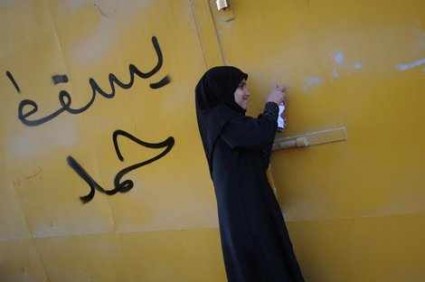
AFP/Getty Images – Bahraini girl calling for the ouster of King Hamad, after funeral for Abdelnabi Kadhim, Manama, November 24, 2011
On November 23, Manama, the modern capital of the tiny Gulf nation of Bahrain, was in an uncharacteristically welcoming mood. Foreign reporters—allowed into the country for the first time in months—were swamped with invitations to a “celebration” at a posh royal palace and offered interviews with usually reticent Bahraini officials. The occasion was the long-awaited release of a report about the government’s strong-armed handling of last spring’s popular uprising. Since the report had been requested—and paid for—by the government itself, officials were expecting a few minor criticisms. Then, they reasoned, the country would move on.
Things didn’t go according to plan.
For one thing, the country shows little sign of moving on from the uprising last February and March, in which government forces brutally cracked down on tens of thousands of people—men and women—many of them belonging to the country’s Shia majority, who had taken to the streets for weeks to voice grievances against the ruling family, who are Sunni. At least 35 people were killed, mostly by security forces and pro-government mobs; thousands were detained; and hundreds of activists, political figures and professionals such as doctors, nurses, lawyers and athletes were tried in closed-door military courts and jailed. And there is still widespread fear of more violence.
In fact, the morning the ceremony was to take place, reports began circulating that a 44-year-old man named Abdelnabi Kadhim had been killed under suspicious circumstances in the small, poor Shiite village of Aali, about an hour from the capital. A handful of us went to see what happened. Like so many of “the villages,” as the Shiite towns outside the capital are called, Aali is a dusty collection of two- and three-story houses made of plywood, corrugated steel, plaster, and bare concrete floors. Substandard housing, high unemployment, and a sense of unequal treatment have made Aali one of a dozen or so centers of protest.
According to people in the village, Kadhim’s car had been rammed by riot police as he was driving his wife to work. (By the time we got to Aali, the car had been removed.) Kadhim had been a regular presence at village protests. When the women in Kadhim’s family gathered to mourn his death, riot police fired tear gas canisters into their home. Neighbors showed us the broken glass from the attack. As they described what happened, a small group of young men and women gathered outside Kadhim’s house to shout, “Down down Hamad!” calling for the overthrow of Bahrain’s King Hamad Bin Isa Al-Khalifa. …more
December 27, 2011 Comments Off on Barricaded in Bahrain
US Congress Standing Up for Accountability for Human Rights Abuses in Bahrain
Representatives Sign Bahrain Arms Sale Resolution
27 December, 2011 – POMED
Representatives Mazie K. Hirono (D-HI), Chris Van Hollen (D-MD), Christopher S. Murphy (D-CT) joined sixteen other cosponsors by signing on to H.J. Res. 80, which calls for “limiting the issuance of a letter of offer with respect to a certain proposed sale of defense articles and defense services to the Kingdom of Bahrain,” originally introduced by Rep. James McGovern (D-MA).
The resolution limits the proposed arms sale, requiring the Secretary of State to “certify to the Committee on Foreign Relations of the Senate and the Committee on Foreign Affairs of the House of Representatives” that the Government of Bahrain “is conducting good faith investigations and prosecutions of alleged perpetrators responsible for the killing, torture, arbitrary detention, and other human rights violations committed since February 2011,” among other measures ensuring the Government of Bahrain’s compliance with international human rights standards. …source
December 27, 2011 Comments Off on US Congress Standing Up for Accountability for Human Rights Abuses in Bahrain
Back to the Narrative of Democracy and problem of Apartheid in Bahrain
Officially a ‘constitutional monarchy’ is based upon similar models in Europe, the reality in Bahrain is that all political decision-making is subject to royal consent, rendering it a de facto absolute monarchy. Central authority resides in the chief of state, KingHamad b. Isa al-Khalifa and his Court Minister Sheikh Khalid b. Ahmed al-Khalifa. The prime minister serves as head of the government but the position holds only that power granted to it by the chief of state, as it is the King who appoints an individual at his discretion to the role. The incumbent prime minister, since 1970, is Sheikh Khalifa b. Salman al-Khalifa.
BROKEN PROMISES Human Rights, Constitutionalism and Socio-economic Exclusion in Bahrain
by Omar F. Ahmed – 2010 Islamic Human Rights Commission – Paper
Executive Summary
As of 2010 Bahrain has not successfully completed its transition from an absolute monarchy in which unqualified power lies with the unelected head of state to a constitutional monarchy that assigns decision-making authority to an elected legislature and representative government. Socio-economic and political exclusion of the wider population is prevalent. The country’s regional economic success belies the fact that a significant proportion of Bahrainis live in poverty and unemployment.
Resentment is further exacerbated when accusations of profligacy and corruption are levelled at some senior government officials who are protected from legal scrutiny and public accountability due to their close proximity to royal power in the country.
Confrontation between the security forces and protestors has resulted in violence and, on occasions, death. The focus of many demonstrations is allegations of discriminatory practices carried out by the ruling Sunni al-Khalifa family against Bahrain’s majority Shia population. Discriminatory policies are deployed as a tool by the ruling government to marginalise and disenfranchise the largest section of Bahraini society. Though outwardly sectarian in nature, these measures are designed to prevent democratic reform, and are therefore not necessarily concerned primarily with religious exclusion. The response by marginalised Shia in turn is fuelled by socio-economic neglect and political marginalisation as opposed to sectarianism. …more
December 27, 2011 Comments Off on Back to the Narrative of Democracy and problem of Apartheid in Bahrain
Free Mahdi ‘Issa Mahdi Abu Dheeb!
Mahdi ‘Issa Mahdi Abu Dheeb, former president of the Bahrain Teacher’s Association, was tried in a Military Court and sentenced to 10 years’ imprisonment.
The charges included using his position within the BTA to call for teachers’ strike, organize marches and demonstrations, incite “hatred of the regime” and seek its overthrow by force. Amnesty International said that it feared Mahdi ‘Issa Mahdi Abu Dheeb may be imprisoned solely on account of their legitimate exercise of their rights to freedom of expression, association and assembly, in which case they should be released immediately and unconditionally and their convictions should be quashed.
December 27, 2011 Comments Off on Free Mahdi ‘Issa Mahdi Abu Dheeb!
Free Mahmoud Asghar!
Dr. Mahmoud Asghar is a doctor in Bahrain who was one of the medical professionals arrested, detained, tortured and sentenced in trial that failed to meet international fair trial standards. Front Line Defenders is calling for all the medical professionals and other human rights defenders in Bahrain to be released immediately.
December 27, 2011 Comments Off on Free Mahmoud Asghar!
The bizzare reality of Womens Rights in Bahrain and Secretary Clinton’s, “Womens Rights are Human Rights”
Hillary Rodham Clinton – excerpt of remarks to the U.N. 4th World Conference on Women Plenary Session – 2009
If there is one message that echoes forth from this conference, let it be that human rights are women’s rights and women’s rights are human rights once and for all. Let us not forget that among those rights are the right to speak freely — and the right to be heard.
Women must enjoy the rights to participate fully in the social and political lives of their countries, if we want freedom and democracy to thrive and endure. It is indefensible that many women in nongovernmental organizations who wished to participate in this conference have not been able to attend — or have been prohibited from fully taking part.
Let me be clear. Freedom means the right of people to assemble, organize, and debate openly. It means respecting the views of those who may disagree with the views of their governments. It means not taking citizens away from their loved ones and jailing them, mistreating them, or denying them their freedom or dignity because of the peaceful expression of their ideas and opinions.
…full text and video HERE
December 27, 2011 Comments Off on The bizzare reality of Womens Rights in Bahrain and Secretary Clinton’s, “Womens Rights are Human Rights”
Hillary Clinton Promotes Women’s Rights Treaty U.S. Has Not Joined
Hillary Clinton Promotes Women’s Rights Treaty That U.S. Has Not Yet Joined
20 November, 2011 – Joshua Hersch – Huffington Post
NEW YORK — On the eve of high-level meetings for the United Nations’ general assembly, Secretary of State Hillary Clinton attended an event on Monday afternoon designed to highlight the importance of women’s participation in public life.
Together with a selection of major female world leaders, including Catherine Ashton, the European Union’s top diplomat, and Michelle Bachelet, the former president of Chile and the head of U.N. Women, Clinton put her name to a document calling for developing countries — especially in the changing Middle East — to clear the way for women to hold leadership roles.
The joint statement read:
We call upon all States to ratify and fulfill their obligations under the UN Convention on the Elimination of All Forms of Discrimination against Women (CEDAW) and to implement fully Security Council Resolution 1325 (2000) on Women and Peace and Security and other relevant UN resolutions.
There was only one problem: the United States is the only industrialized nation — and one of only seven in the world — that has not yet signed onto the CEDAW treaty.
[Read more →]
December 27, 2011 No Comments
Secretary Clinton stands silent while Womens Rights Trampled in Bahrain
Bahrain: Imprisoned for playing revolutionary songs in her car
15 December 2011 – Freemuse
According to the Bahrain Center for Human Rights (BCHR), 38 year old Fadhila Al Mubarak has been sentenced to 18 months in jail for participating in peaceful protests and for playing a revolutionary CD in her car.
On 27 March 2011, Fadhila Al Mubarak was asked to pull over at a checkpoint because she had a CD with revolutionary songs playing in her car. She had her 9 year old son with her in the car at the time of the arrest. According to BCHR she was insulted, called names and cursed at.
No contact during detention
It took four days for Fadhila Al Mubarak’s family to find out in which police station she was held in custody. She was detained for about one month and during the period of her detention, her family was not allowed to visit her nor talk to her over the phone. When family members tried to appoint her a lawyer, the request was rejected by the military court.
On 17 May, Fadhila Al Mubarak was convicted of offending a public official, inciting hatred towards the regime by playing an audio recording of revolutionary music, taking part in illegal protests and possession of a poem about the Bahriani revolution. She was sentenced by the military court to four years of imprisonment without being represented by a lawyer. …more
December 27, 2011 Comments Off on Secretary Clinton stands silent while Womens Rights Trampled in Bahrain
The Perverse Reality of King Hamad
December 27, 2011 Comments Off on The Perverse Reality of King Hamad
Secretary Clinton, what about the Rights of Women in Bahrain – Step up or resign Secretary Clinton
Bahrain medics recall jail ‘horror’
By Ali Khalil (AFP) – 26 december, 2011
MANAMA — Shiite Muslim doctors, out on bail in Bahrain pending retrial for their role in pro-democracy protests, look back with horror at months of torture and demand a neutral hearing.
“I can’t talk,” sobbed consultant paediatrician Nader Dawani, recounting how he was forced to stand up for seven days, while being beaten repeatedly, mainly by a female officer.
“She was the harshest. She used to hit me with a hose and wooden canes, many of which broke on my back,” said the frail 54-year-old man.
“They attempted to insert a bottle in my anus,” he recounted.
Dawani is one of a group of medics arrested after security forces in the kingdom ruled by the Sunni Al-Khalifa dynasty crushed a Shiite-led uprising inspired by Arab Spring protests that toppled the rulers of Tunisia and Egypt.
They face a plethora of charges, the most serious of which is occupying the Salmaniya Medical Centre and possessing weapons, while denying access to the hospital to Sunnis as Shiite demonstrators camped in the complex’s car park.
The doctors also stand accused of spreading false news — particularly concerning the condition of wounded protesters — illegal acquisition of medicines and medical facilities, and participating in demonstrations.
Thirteen were convicted by a military court on September 29 and sentenced to between five and 10 years in jail. But before the verdict was handed down, they had already been released and now face retrial before a civil appeals court.
Claims that torture was used against scores of Shiite detainees, including the medics, were upheld in November by the Bahrain Independent Commission of Inquiry, a panel tasked by King Hamad with investigating the crackdown following an international outcry over alleged human rights violations.
King Hamad said he was “dismayed” by the findings of the report concerning the use of torture, and pledged reforms.
“We do not tolerate the mistreatment of detainees and prisoners,” he said.
Many Shiite medics who were not arrested, like consultant neurosurgeon Taha al-Derazi, lost their jobs just for being photographed at a demonstration.
The medics insist that they are innocent. The commission’s report stated the charges that they inflated the number of protesters injured were unfounded, noting that hospital records showed hundreds were admitted during mid-February.
“All my statements to media were related to the wounded,” said consultant orthopaedic surgeon Ali Alekri, insisting he did not meddle in politics and only led demonstrations against the then health minister who was later sacked.
“Our slogans were clear: sack the minister and his administration for failing to protect medics, halting ambulance movement when needed and giving false information on numbers of casualties,” he said.
“We never called for the fall of the regime,” he added.
Alekri said the medics “need a neutral body,” an “international judicial body” to judge them. “We don’t trust the Bahraini judicial system.”
It was speaking out that got them in trouble, the medics said.
“We are witnesses to the crimes of the regime,” said Dawani, who, like most of his sentenced colleagues, and other foreign and Sunni medics, appear in abundant video footage treating casualties at the SMC accident and emergency department.
Rula al-Saffar, the head of the Bahraini Nursing Society, who faces 15 years in jail, said the authorities wanted to humiliate the Shiite elite.
“We are the elite of Bahrain… They want to tell the well-off Shiite families that they can humiliate them,” said Saffar, 49, who said she shocked her interrogators when she told them her mother was a Sunni.
During five months in custody, Saffar said she treated more than 200 female fellow prisoners who were subjected to torture and did not escape abuse herself.
“At night they would take me blindfolded. I can smell alcohol fuming with their breaths. One interrogator would say: It is the weekend and we are a group. If you don’t confess, we will sleep with you one at a time.”
…source
December 26, 2011 No Comments
As Human Rights Pressure mounts and King Hamad loses Public Relations campaign, underground government backed terrorism against opposition to increase
Bahrain: Demonstrations Continue Facing Regime’s Brutality
Local Editor – moqawama.org
As Bahraini people continue demonstrating against the brutality of the regime in various several towns and villages across the country, the Bahraini forces continue attacking civilian protesters.
Demonstrations were held in the eastern town of Sitra, the northern village of Dair, and several other areas.
Calling for “freedom, reform, and regime change,” protesters chanted slogans against the al-Khalifa ruling dynasty.
However, Saudi-backed regime forces used tear gas to severely disperse the protesters.
In parallel, the latest reports from Bahrain revealed that the al-Khalifa regime has hired armed militia to create fear and horror among the Bahraini people and suppress the revolutionary figures.
According to the reports, the Bahraini militia forces backed up by the military and security forces of the regime attacked the residential areas in Hamad and Dar-al-Kalib and created horror among people.
The Bahraini militia forces also practiced assault and battery against people and destroyed their properties.
Meanwhile, state media announced Saturday that Bahraini authorities had dropped charges relating to freedom of expression against “343 individual suspects in 34 cases” linked to anti-regime demonstrations in February and March.
However, Matar Matar, a member of the main opposition group, al-Wefaq, censured the announcement, saying that it is “a media show, not linked to the application of the recommendations of the independent commission of inquiry.” …source
December 26, 2011 Comments Off on As Human Rights Pressure mounts and King Hamad loses Public Relations campaign, underground government backed terrorism against opposition to increase
King Hamad new intensity of provocation and aggressiveness toward opposition protests
Bahrain police fire rubbet bullets and tear gas at Shiite opposition offices
23/12/2011 – Bahrain Freedom Movement
Bahrain police attacked the headquarters of the main Shiite opposition party in the capital on Friday, after the group challenged a new government ban on its weekly protests, the Associated Press reported.
Security forces fired rubber bullets at the headquarters and used tear gas to disperse hundreds of people trying to protest elsewhere in the capital. This was the latest episode between Bahrain’s Sunni monarchy and the opposition movement in the last 10 months of unrest. The movement is led by Shiites, the country’s majority, who have long complained of discrimination, the AP reported.
According to Al Jazeera, Matar Matar, a former al-Wefaw member of parliament said the people had given the government proper notice of the protest but police still used excessive force to remove them.
“Today, the government did not allow us to do our protest. Even the legal protests are facing difficulty and the space is reducing for the freedom of expression,” Matar told Al Jazeera. “We were expecting the opposite after the BICI [Bahrain Independent Commission of Inquiry] report; that there would be more space.”
Read more at GlobalPost: Bahrain: Fresh protests as report charges government with excessive force
This was the first time the weekly Friday protesters were banned by authorities since emergency laws were lifted in June. The Interior Ministry gave reasons for banning the event, including that it would block road traffic and endanger others in the area, the AP reported. The Ministry also said on its Twitter account that a group of people hurled stones at police forces.
Shiite clerics defied government orders on Friday and still held prayer services on the rubble of mosques that had been bulldozed by the government earlier this year. It was the first time Shiite clerics took part in the protest movement, the AP reported. According to the Shiites, at least 38 mosques used by their congregations have been bulldozed since protests began in February. …source
December 26, 2011 Comments Off on King Hamad new intensity of provocation and aggressiveness toward opposition protests
Demonstrators severly beaten by Security Forces
Three demonstrators were subjected to severe torture after being arrested by Bahraini security forces
December 24th, 2011 – BYCHR
The Bahraini security forces yesterday (December 24, 2011) detained three demonstrators, and were subjected to brutal torture.
The Security forces used batons and wooden sticks.
The Bahrain Youth Society for Human Rights (BYSHR) interviewed them yesterday.
Additional details:
Dozens of protesters took part in the march (Village of Karzakan).At 5 pm, security forces arrested three protesters.
Security forces detained them in a building belonging to the Ministry of the Interior.
Had been tortured for two hours and then were released.
Bahrain Youth Society for Human Rights (BYSHR) expresses its deep concern due to torture of demonstrators and demanded an immediate investigation into these allegations. …source
December 26, 2011 Comments Off on Demonstrators severly beaten by Security Forces
Victim of kidnapping, beating and torture, by Security Forces – 26 December
December 26, 2011 Comments Off on Victim of kidnapping, beating and torture, by Security Forces – 26 December
Free Alkhawaja!
December 25, 2011 No Comments
Bahrain, a Sister Speaks Out
December 25, 2011 No Comments
Bahrain’s Political Prisoners never to be Forgotten
December 25, 2011 Comments Off on Bahrain’s Political Prisoners never to be Forgotten
A Smile for Saturday Morning, there will be no quenching their flame
December 24, 2011 Comments Off on A Smile for Saturday Morning, there will be no quenching their flame
Desperation, survival and escape from the human condition called oppression – tyranny names the terrorist
How I became a ‘terrorist’
At 16, entering the steel gates of the Israeli military prisons, I could never go back to my former life. Levinger’s outpost, his settler violence, permanently changed my life.
By Abdelrahman Al Ahmar
The first time I was attacked by an Israeli settler, I was 14 years old. I was walking to school when an armed man wearing a skullcap, standing near some Israeli soldiers, pulled my pack off my back and threw it in the mud. That wasn’t last month, nor was it near a new outpost in Nablus. Rather, this happened 30 years ago, on the main road running through Bethlehem, near Deheisheh refugee camp, where I lived. The settler was not just any alienated, disaffected man. He was, I learned later, the father of the national religious settlement project – Rabbi Moshe Levinger.
In those days, the settlers and the Egged buses on their way to and from the nascent settlements in the area would drive right by the camp. Their vehicles were often the targets of many rocks: Who among us wanted armed Israelis using our roads? Levinger wanted to show us who was boss. At first he would stop his car, and chase and try to attack us. He would scream at the soldiers stationed on the road to arrest and beat the kids. Soldiers would then fire tear gas and play cat-and-mouse with us in the camp’s alleys.
Emboldened by army support, Levinger and his fellow “pioneers” would enter the camp and open fire randomly. Clashes would ensue. The soldiers would then run after us and make arrests while Levinger and his friends would return to their cars and drive home to their settlements. The violence became a daily event.
This is what life was like for me and my friends during these years. For Levinger and his nationalist movement, it constituted a disruption of their commute to and from Jerusalem. To placate these champions of Zion, the Israel Defense Forces finally erected a nine-meter-high fence, topped with barbed-wire, around Deheisheh. The camp’s thousands of residents now had a single way in and out, and it was guarded by soldiers, making it like living in a prison. A 7 P.M. curfew was in place for years. …more
December 23, 2011 Comments Off on Desperation, survival and escape from the human condition called oppression – tyranny names the terrorist
Women, Revolution, Politics and Power
Because current Arab revolutions are not led by a single party with a formal structure and ideology, the post-revolutionary struggle for power is often surprising, incomprehensible and nebulous.
Women, Revolution, Politics and Power
by Dalal al-Bizri – Gunda Werner Institute
Revolution is a broad church; it is a warm embrace, welcoming, lavish; it is a time of rapture, hope and dreams; it is the festival, the ‘carnival’ as some call it. So many of those who take part in it claim to be happy, to have been reborn, risen again from death. So many have wept for joy.
Revolution is an epic of beatification. Its participants and sympathisers imagine that their lives will be better after it has won out and tyranny has fallen— they will be able to succeed, to build, to achieve—for revolution is like an amnesty, like the month of Haram when no blood may be shed. It is a state of pure solidarity in which those who yesterday were strangers, of every stripe and type and creed, sing in harmony, their sensitivities, the jealousies and resentments that divided them, vanished in the wind. It is an unprecedented state that gives birth to unprecedented: martyrdom and sacrifice, the rise to prominence of those who were once alienated from politics, and at their head, women.
Before the current Arab revolutions women had little to do with politics. Those who reached positions of official power were possessed of a corrupt and authoritarian mentality or were taken by the superficial appeal of their offices. In civil society they were a little more fortunate, but in society at large women were allowed no political say or occupation. Roles were strictly apportioned along gender lines, a deficiency exacerbated by the comatose state of pre-revolutionary society in which all avenues for advancement remained shut off.
When the revolutions began, women took to the stage in unprecedented numbers. They entered politics through the demonstrations, the revolutionary activity par excellence, and though their presence and visibility in these positions varied considerably it was nonetheless genuine and undeniable. The revolutions are neither nationalistic nor class-based, but democratic, and as one of their guiding principles is the championing of human rights, it is only logical that women’s rights should be elevated with them. Women, after all, are humans, too.
This positive aspect of the revolution was not a consciously formulated position but was implicit in it. No less implicit was the revolution’s central aim— bringing down tyranny—and any attempt to highlight secondary aims, such as women’s rights was seen as a threat to the movement’s objectives. Yet this more negative corollary did not prevent women taking part with all the fervour of those who believe that they have been promised a greater role in a matter that is as important for them as it is for men, i.e.: the matter of their interest and engagement in the political life and issues of the countries where they live. Revolution is thus something that is by its very nature political and concerns everybody: it welcomes women’s participation.
Post-revolution, politics cedes to issues of power. Immediately that the central demand of the revolution has been granted the political arena shrinks and the battle for control begins. The agency of the individual is reduced to its lowest ebb. The framework within which a new legitimacy will be forged is yet to take shape and the movement for change loses its appeal. Between two worlds, it is a time in which the most organised assume control rather than the most dedicated or effective. And as long as the political struggle continues, so it remains: the preserve of the most organized and the best equipped to wield power.
If the majority of men are excluded by this process, then all of the women certainly are. Women have no experience of organised politics or of exercising power. In our current post-revolutionary, or ‘transitional’ state, the public mood changes. The Egyptian author Ezzedine Choukry Fishere describes Midan Tahrir a week after Mubarak’s resignation:
“It’s strange… The square is full of food containers and plastic bags. The youths who bustled about carrying rubbish bags have vanished. The demonstrators, with their open hearts, their organization, their music, their artistic exuberance and their clever, playful sings, have disappeared and in their place jostling crowds of unfeeling louts…’ (New Carmel Magazine, Summer 2011, p.155)
In the days that followed the mood will become more hostile. Women are not only excluded from politics, but also subjected to extreme violence, instances of which are documented by women’s and rights groups.
It’s the Algeria Syndrome. During Algeria’s revolutionary war in the late Fifties and early Sixties of the last century, Algeria’s women stood side by side with men, suffering hardship and making sacrifices. As soon as the revolution achieved its purpose, these women were sent home, gradually oppressed and marginalized and subjected to every kind of violence and discrimination. The syndrome this gave rise to is reflected in the country’s female revolutionary literature: the experience may have been a negative one, but the women accepted it.
Yet there is something else, as well. Because current Arab revolutions are not led by a single party with a formal structure and ideology, the post-revolutionary struggle for power is often surprising, incomprehensible and nebulous. The decreasing participation of women in politics, or the discrimination against them, does not manifest itself in familiar, traditional ways, though the two expressions of bigotry are linked. It takes time to understand the motives and mechanisms that lie behind this new form of bigotry. In both Tunisia and Egypt, women’s demonstrations have come under attack from individuals or small aggressive groups who scream in their faces for them to go home or get back to the kitchen, their ‘natural place’. We should also mention the wide range of activities through which Salafis express their views and positions on women. …more
December 23, 2011 No Comments
Lament of the Wealthy in America, absent sober reflection on the Squares running red with blood of arrogant Capitalists, in China not so long ago
A Christmas Message From America’s Rich
From Matt Taibbi – 23 December
It seems America’s bankers are tired of all the abuse. They’ve decided to speak out.
True, they’re doing it from behind the ropeline, in front of friendly crowds at industry conferences and country clubs, meaning they don’t have to look the rest of America in the eye when they call us all imbeciles and complain that they shouldn’t have to apologize for being so successful.
But while they haven’t yet deigned to talk to protesting America face to face, they are willing to scribble out some complaints on notes and send them downstairs on silver trays. Courtesy of a remarkable story by Max Abelson at Bloomberg, we now get to hear some of those choice comments.
Home Depot co-founder Bernard Marcus, for instance, is not worried about OWS:
“Who gives a crap about some imbecile?” Marcus said. “Are you kidding me?”
Former New York gurbernatorial candidate Tom Golisano, the billionaire owner of the billing firm Paychex, offered his wisdom while his half-his-age tennis champion girlfriend hung on his arm:
“If I hear a politician use the term ‘paying your fair share’ one more time, I’m going to vomit,” said Golisano, who turned 70 last month, celebrating the birthday with girlfriend Monica Seles, the former tennis star who won nine Grand Slam singles titles.
Then there’s Leon Cooperman, the former chief of Goldman Sachs’s money-management unit, who said he was urged to speak out by his fellow golfers. His message was a version of Wall Street’s increasingly popular If-you-people-want-a-job, then-you’ll-shut-the-fuck-up rhetorical line:
Cooperman, 68, said in an interview that he can’t walk through the dining room of St. Andrews Country Club in Boca Raton, Florida, without being thanked for speaking up. At least four people expressed their gratitude on Dec. 5 while he was eating an egg-white omelet, he said.
“You’ll get more out of me,” the billionaire said, “if you treat me with respect.”
Finally, there is this from Blackstone CEO Steven Schwartzman:
Asked if he were willing to pay more taxes in a Nov. 30 interview with Bloomberg Television, Blackstone Group LP CEO Stephen Schwarzman spoke about lower-income U.S. families who pay no income tax.
“You have to have skin in the game,” said Schwarzman, 64. “I’m not saying how much people should do. But we should all be part of the system.”
There are obviously a great many things that one could say about this remarkable collection of quotes. One could even, if one wanted, simply savor them alone, without commentary, like lumps of fresh caviar, or raw oysters.
But out of Abelson’s collection of doleful woe-is-us complaints from the offended rich, the one that deserves the most attention is Schwarzman’s line about lower-income folks lacking “skin in the game.” This incredible statement gets right to the heart of why these people suck. …more
December 23, 2011 Comments Off on Lament of the Wealthy in America, absent sober reflection on the Squares running red with blood of arrogant Capitalists, in China not so long ago
Babies wait on the day King Hamad is no more – Gas victim Sitra 22 December – Secretary Clinton your “friends’ in Bahrain are doing your dirty work gassing babies!
December 23, 2011 Comments Off on Babies wait on the day King Hamad is no more – Gas victim Sitra 22 December – Secretary Clinton your “friends’ in Bahrain are doing your dirty work gassing babies!
Gas Assault on Tubli 23 December
December 23, 2011 Comments Off on Gas Assault on Tubli 23 December

